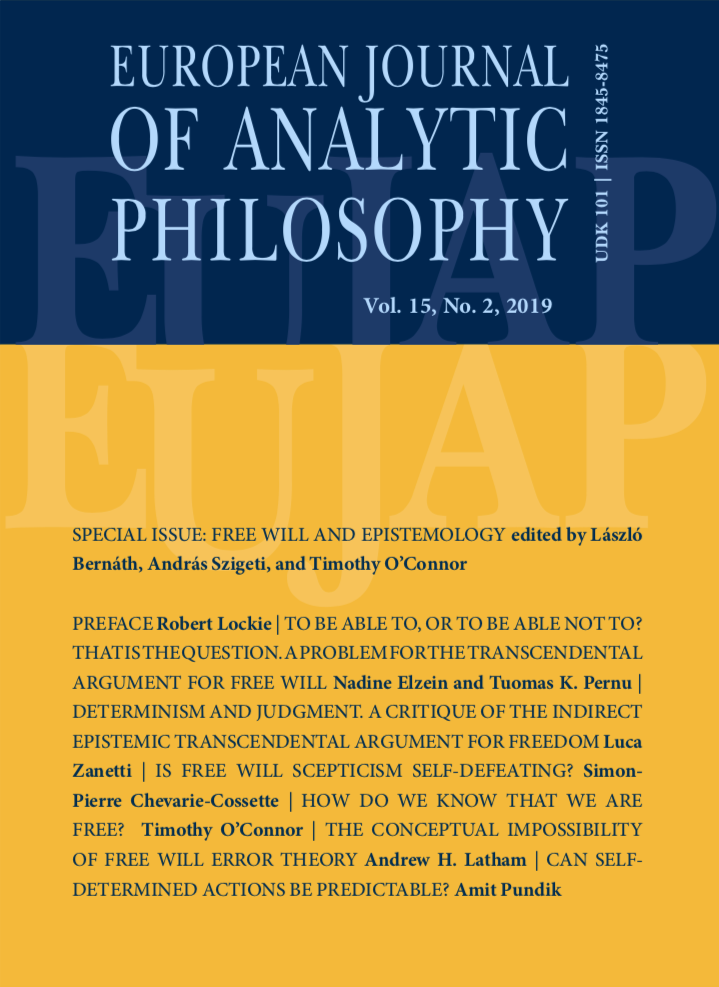DOWNLOAD FULL ISSUE VOL. 19, NO. 2, 2023
RESEARCH ARTICLES
David Sackris and Rasmus Rosenberg Larsen
Article 1 | Pages: (A1)1-23 | Abstract | DOI: 10.31820/ejap.19.2.1
Recent contributions in moral philosophy have raised questions concerning the prevalent assumption that moral judgments are typologically discrete, and thereby distinct from ordinary and/or other types of judgments. This paper adds to this discourse, surveying how attempts at defining what makes moral judgments distinct have serious shortcomings, and it is argued that any
typological definition is likely to fail due to certain questionable assumptions about the nature of judgment itself. The paper concludes by raising questions for future investigations into the nature of moral judgment.
Fabio Tollon
Article 2 | Pages: (A2)1-15 | Abstract | DOI: 10.31820/ejap.19.2.2
In this paper I aim to establish that our belief in free will is epistemically innocent. Many contemporary accounts that deal with the potential “illusion” of freedom seek to describe the pragmatic benefits of belief in free will, such as how it facilitates or grounds our notions of moral responsibility or basic desert. While these proposals have their place (and use), I will not explicitly engage with them. I aim to establish that our false belief in free will is an epistemically innocent belief. I will endeavour to show that if we carefully consider the circumstances in which particular beliefs (such as our belief in free will) are adopted, we can come to better appreciate not just their psychological but also their epistemic benefits. The implications, therefore, for future investigations into the philosophy of free will are that we should consider whether we have been too narrow in our pragmatic defences of free will, and that we should also be sensitive to epistemic considerations.
Marcus William Hunt
Article 3 | Pages: (A3)1-25 | Abstract | DOI: 10.31820/ejap.19.2.3
The paper offers an account of co-parenthood according to which co-parents are parent and child to one another. The paper begins by reviewing extant theories of the value of being a parent, to see whether the value of co-parenthood is reducible to this. Finding that it is not, I briefly elaborate a theory of parenthood on which parents are those who create persons. Using Aristotle’s four causes as a helpful prism, I outline how parents are the cause of their child, and how in causing a child together co-parents become parent and child to one another. For instance, since parents create children by offering themselves as models to be copied, co-parents should enjoy the best type of friendship with one another, each treating the other’s flourishing as a human person as their end. I suggest that co-parenthood contains parenthood virtually, that the co-parents’ love of their child is a manifestation of their love for one another, that the teleological fulfilled state of the friendship between parent and child exists in the friendship of co-parents.
Elizabeth Ventham
Article 4 | Pages: (A4)1-23 | Abstract | DOI: 10.31820/ejap.19.2.4
This paper argues that an agent’s moral obligations are necessarily connected to her desires. In doing so I will demonstrate that such a view is less revisionary—and more in line with our common-sense views on morality—than philosophers have previously taken it to be. You can hold a desire-based view of moral normativity, I argue, without being (e.g.) a moral relativist or error theorist about morality. I’ll make this argument by showing how two important features of an objective morality are compatible with such a desire-based account: 1) morality’s authoritative nature, 2) our ability to condemn immoral agents.
Andrea Raimondi
Article 5 | Pages: (A5)1-17 | Abstract | DOI: 10.31820/ejap.19.2.5
Armstrong famously argued in favour of introducing totality facts in our ontology. Contrary to fully negative (absence) facts, totality facts yield a theory of “moderate” or “partial” negativity, which allegedly provides an elegant solution to the truthmaking problem of negative claims and, at the same time, avoids postulating (many) first-order absences. Friends of totality facts argue that partial negativity is (i) tolerable vis-à-vis the Eleatic principle qua mark of the real, and (ii) achieves a significant advantage in terms of ontological parsimony. But are totality facts, which are partially negative, really more ontologically acceptable than fully negative facts? In this paper, we argue that, comparatively, the case for totality facts is weaker than commonly assumed and that, ultimately, the answer is negative.

